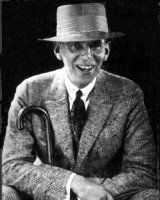Podcast: Play in new window | Download (Duration: 16:58 — 15.6MB) | Embed
Subscribe: More
Episode 20: The Most Lovable Conman of the Alaska Gold Rush

One of the most scandalous persons to be associated with Nome was Wilson Mizner, a loveable scoundrel. Mizner was involved with gambling and prize fighting in Nome, and it was said he was probably the only man with the reputation of being able to “borrow money from a lamppost and is said to be the only man who ever hired the Nome brass band on credit.” In addition to these northern distinctions, in the course of Mizner’s life, he was also a mining engineer, actor, playwright, Fifth Avenue art dealer, husband of the “second richest woman in the world,” proprietor of the legendary Brown Derby in Los Angeles and, with his brother Addison, a founder and promoter of Boca Raton, Florida.
____________________________________________________________________________________________________________
This podcast is sponsored by Author Masterminds and the Readers and Writers Book Club.
Check out the Author Masterminds Website
Get to know the authors at The Readers and Writers Book Club
________________________________________________________________________________________________
Meet Steve Levi, your host for Episode 20: The Most Lovable Conman of the Alaska Gold Rush
Steve Levi is a 70-something writer in Alaska. He specializes in the impossible crime and the Alaska Gold Rush. An impossible crime is one in which the detective must figure out HOW the crime was committed before he can go after the perpetrators. As an example, in THE MATTER OF THE VANISHING GREYHOUND, the detective must figure out how a Greyhound bus with four bank robbers, a dozen hostages, and $10 million can vanish off the Golden Gate Bridge. Steve’s books can be seen at www.authormasterminds.com/steve-levi and www.steverlevibooks.com. He also does two historical uploads a week. Send Steve your email, and he will include it in the mailings.
Now Available:
The historical key to understanding the Alaska Railroad is that it started as a Socialist dream. It was a profit-making instrument owned by the government. By the time the railroad finished, the dream of socialism as a governmental form had died. The Russian Revolution showed how flawed socialism by a national government was, the hard-core socialist, anarchist, and syndicalist radicals had been deported on the BUFORD, and the end of World War I flooded American stores with consumer goods. The Roaring Twenties had started, and everyone was making money, and there was no longer a need to have a ‘socialist’ government.




